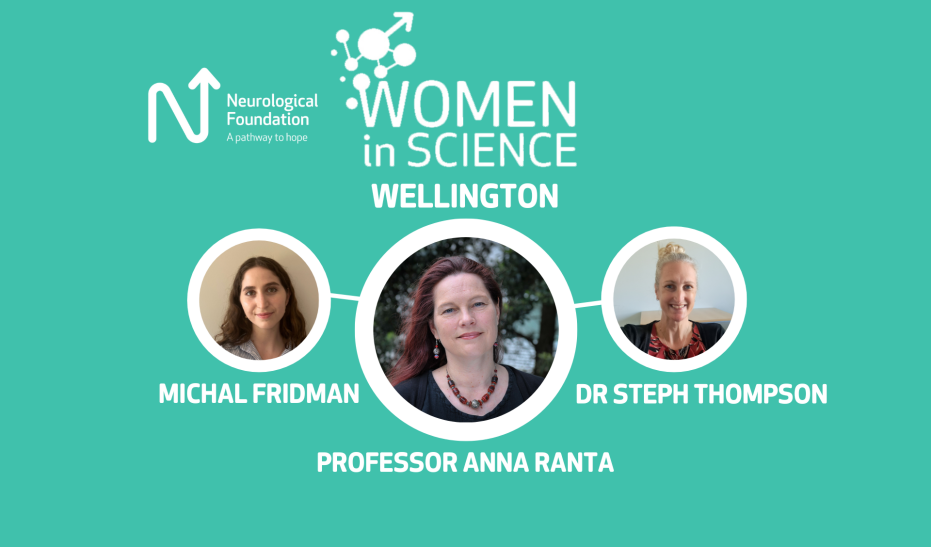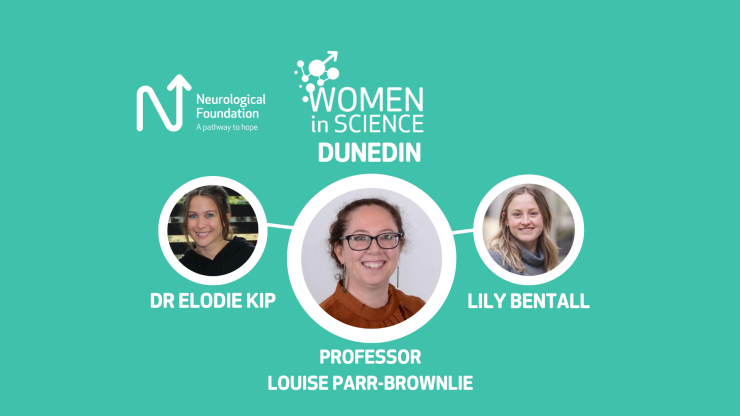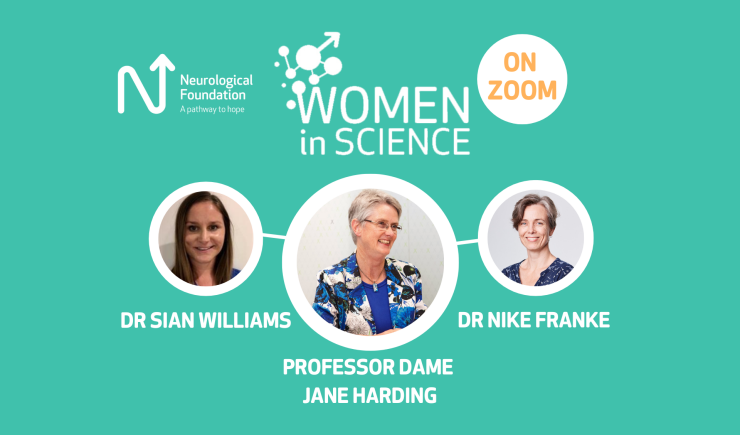 Waterfront Room, Harbourside Function Venue, 4 Taranaki Street, Wellington
Waterfront Room, Harbourside Function Venue, 4 Taranaki Street, Wellington
 18:00 PM Tuesday, 21 February 2023
Register
18:00 PM Tuesday, 21 February 2023
Register
WOMEN IN SCIENCE
The Women in Science event series is an opportunity to learn more about the brains behind life-changing research happening right now in New Zealand. This ‘behind the scenes’ look into the careers, experience, passion for neuroscience and vision for hope of a fascinating group of leading and emerging researchers is an exclusive opportunity to learn about what’s happening in the New Zealand and global neurological science sector.
This is our second event in the 2023 series, hosted by Neurological Foundation’s Head of Research Dr Sarah Schonberger, giving us the chance to bring you, our amazing supporters, a little bit closer to the researchers and learn more about the work that your support makes possible.
Join us in person at this event, hosted in the beautiful Cable Room, Harbourside Function Venue, where we will be joined by three brilliant minds from University of Otago, Wellington who are committed to improving outcomes for stroke patients across Aotearoa New Zealand. Spearheaded by Professor Anna Ranta, an academic stroke neurologist and the head of the Department of Medicine at the University of Otago, Wellington, this team of researchers will share their background, experience, and knowledge. They will be sharing valuable, alternate perspectives on a disease that is New Zealand’s second biggest killer, with over 9,500 strokes experienced every year.
Leading the charge, with over two hundred peer-reviewed publications, Professor Anna Ranta’s research focuses on hyper-acute stroke and transient ischaemic attack (TIA) service delivery optimisation. She is involved in numerous studies and holds multiple positions and co-directs the Ministry of Health National Stroke Clot Retrieval Service Improvement Programme. Professor Ranta has dedicated her career to looking into the effects of stroke and how we can better serve those who are at risk. Born and raised in Germany, Professor Ranta completed her neurology training at the University of Virginia, USA, and has been living and working in NZ for over 16 years with her family.
Professor Ranta has mentored many young researchers and will be able to talk on many aspects of neurological research in the applied setting including her experience as the first adult neurology professor in Aotearoa and what’s been involved in breaking through a glass ceiling or two along the way.
Joining Professor Ranta is Dr Stephanie Thompson, an academic physiotherapist who recently completed her PhD on assessing ethnic and geographic inequities in Stroke Care across Aotearoa New Zealand. She leads the rehabilitation team in the district health service and aims to put some of her findings into practice to directly benefit our population. Originally from the Wellington area, Dr Thompson obtained her Physiotherapy degree from University of Otago and has lived in many locations in both New Zealand and abroad.
Rounding out the panel is Michal Fridman, BSc, an emerging young researcher and 5th year medical student at the University of Otago in Wellington. With a degree in neuroscience, Michal has worked with Professor Ranta to assess patient access to hyper-acute stroke therapy across New Zealand,focussing especially on sex differences in access to immediate stroke treatments that help prevent permanent brain damage. Michal is originally from Nelson.
EVENT DETAILS
Tuesday 21st February, 6pm – 8pm, The Cable Room, Harbourside, 4 Taranaki St, Wellington
Doors for registration and seating will open at 5.30 pm. There will be a mix and mingle period after the event with tea and coffee.
Parking: there in no onsite parking at the venue however there are parking buildings and options in nearby streets around the venue.
SPEAKERS
Prof Anna Ranta, MD, PhD, FRACP, FAHA, FWSO is an academic stroke neurologist and the Head of Department of Medicine at University of Otago, Wellington, New Zealand. Her research focuses on hyper-acute stroke and TIA service delivery optimisation, health registries, big data linkage, health equity, health economics, clinical networks, and knowledge translation. She is the primary investigator (PI) for the New Zealand Health Research Council (HRC) funded REGIONS Care study assessing ethnic and geographic inequities in stroke service access and outcome, PI for a pragmatic community based cluster randomized clinical trial (RCT) assessing telestroke inside the ambulance, Co-PI for the B-SAFE study, an HRC funded study testing the impact of an atrial fibrillation primary care electronic decision support tool, and co-leads the data linkage aspects of the HRC funded ARCOS V Programme – a greater Auckland stroke epidemiology study that has spanned over four decades. She has 200+ peer reviewed publications. She was born and raised in Germany, completed her neurology training at the University of Virginia, USA, and has been working and living with her family in New Zealand for the past 16 years. She has led numerous local, regional, and national stroke initiatives including the implementation of New Zealand’s first regional telestroke network, the development of the National Stroke Registry, and currently co-directs the Ministry of Health National Stroke Clot Retrieval Service Improvement Programme. She is also the immediate past President of the Neurological Association of New Zealand, the secretary of the Stroke Society of Australasia, a World Stroke Organization Board and Global Policy Committee Member, and serves on the editorial boards of Stroke, Neurology and the Journal of the American Heart Association.
Dr Stephanie Thompson, PhD, is an academic physiotherapist who recently completed her PhD working with Prof Ranta on assessing ethnic and geographic inequities in Stroke Care across Aotearoa New Zealand. She has conducted prior research on community rehabilitation focussing on patient access. Her PhD work included patient surveys highlighting challenges around communication, transitions of care, and the generally very limited access to post-stroke community rehabilitation and support for people with stroke in our country. She has now returned to work within the district health services leading the rehabilitation service with the aim to put some of her research findings into practice to directly benefit our population. She is originally from the Wellington area, obtained her Physiotherapy degree from the University of Otago, and has lived in many locations both in New Zealand and abroad. She is committed to improving stroke care through a combination of clinical improvement work and research, which is a strong theme within her and Prof Ranta’s shared vision. Dr Thompson provides a valuable alternative perspective to health science coming from an allied rather than medical background that strengthens the research team and will have much experience to share on the challenging and rewards of completing a PhD even after having already embarked on a very successful clinical career.
Michal Fridman, BSc, is an emerging young researcher and a 5th year medical student at the University of Otago. She completed a degree in neuroscience prior to entering medical school and is passionate about brain research and patient care. She has worked extensively with Prof Ranta to assess patient access to hyper-acute stroke therapy across Aotearoa New Zealand. In contrast to Dr Thompson’s work, Michal has focussed more on the pointy end of stroke exploring especially sex differences in access to immediate stroke treatments that help prevent permanent brain damage. She has uncovered important differences by sex that she plans to explore further in the coming year. Michal is originally from Nelson, but now studies in Wellington. As a current medical student and an emerging scientist Michal will be able to share her hands-on experience working with Prof Ranta while developing as a junior medical scientist.







